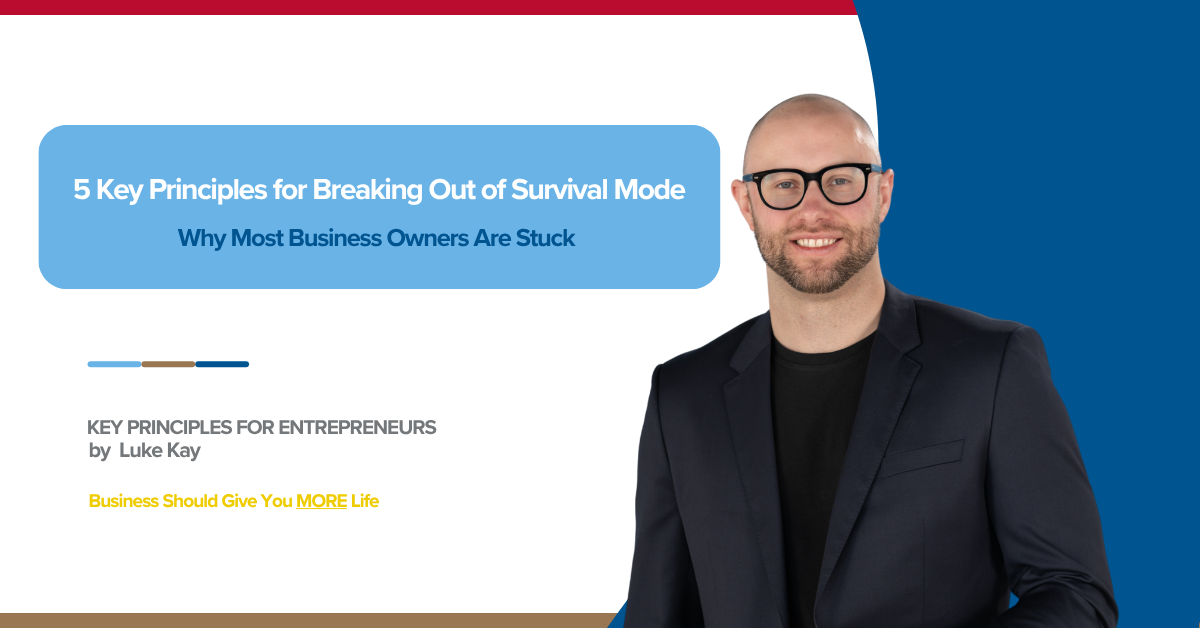
You didn’t start your business to live in a constant state of panic!
Unfortunately, for too many business owners, that’s exactly how it feels: you’re working flat-out, running on a hamster wheel, putting out fires, and still not seeing the profit, freedom, or growth you were promised.
It’s called survival mode, and it’s more common than you think. But the good news? It’s not permanent. You can break out of it, take back control, and build a business that runs smoothly and profitably.
Let’s look at 5 guidelines that will move you out of daily chaos and into confident growth.
Key Principle #1: Own Your Diary, Don’t Let It Own You
When your diary is packed with back-to-back tasks, backlogged emails, and last-minute client panics, you’re just reacting to your business instead of running it. You’re in survival mode, being stuck in delivery instead of driving direction.
You have to get ruthless about what really makes a difference, only then will you be able to take control of your time. Block out “Working On The Business”-time in your calendar every week to focus ON the business: strategic planning, marketing review, people development, or profit analysis. That time is non-negotiable.
If you don’t schedule it, it won’t happen, and you’ll stay stuck reacting to everyone else’s priorities.
Key Principle #1 Case Study: Lucy Hitchcock, Sassy Digital
Lucy was buried in client work with zero time to scale. She restructured her week using time-blocking to prioritise her own business growth—marketing, offers, systems. That shift helped her double her revenue, launch Partner in Wine, and regain her work-life balance.

Key Principle #2: Systemise the Repetitive
If you find yourself answering the same questions or repeating the same tasks every week, it’s time to systemise. Chaos takes over when you are in survival mode. When everything lives in your head, nothing moves, and your team can’t support you properly.
Simple systems doesn’t mean complex tech. It could be a checklist, an email template, a documented process, or an automated workflow.
Once your repetitive tasks are systemised, they can be delegated, automated, or handed off, giving you back hours of time and reducing stress instantly.
Key Principle #2 Case Study: Adam Bamford, Colleague Box
Adam and his wife Natalie grew their gifting business fast but were stuck in manual processes. By introducing templated client onboarding, automated order fulfilment flows, and standardised packing processes, they scaled efficiently and took on corporate clients like Sky—without hiring a massive team.

Key Principle # 3: Say No to What Doesn’t Pay
One of the hardest lessons in business?
You don’t have to say yes to every opportunity that comes along. In survival mode, you tend to grab at everything. Every new enquiry, every last-minute job, every discount request, just to keep cash coming in. But this leads to burnout and little return.
The breakthrough comes when you get clear on what actually makes money. Audit your products, services, and clients. Ditch the low-margin, high-stress work and focus on what delivers real value and profit.
Saying “no” is what creates space for better clients, better offers, and better growth.
Key Principle #3 Case Study: Juliet Barratt, Grenade
Juliet helped steer Grenade through rapid growth by focusing on their best-performing product; protein bars. Instead of trying to serve everyone with everything, they cut underperforming lines and doubled down on what sold best. That decision played a key role in the company’s eventual £200M exit.

Key Principle #4: Build a Self-Managing Team
If you are still approving every decision, and trouble-shooting every problem that lands on your desk, you haven’t built a business, you’ve built a bottleneck. The switch from survival mode to scale starts when your team can operate without you being involved in every move.
That requires more than delegation. It means giving people ownership, clear goals, and the freedom to make decisions. It also means accepting that not everything will be perfect, but progress is better than perfection. A business only becomes scalable when the team can perform without constant micromanagement.
Key Principle #4 Case Study: Deborah Mitchell, Heaven Skincare
Deborah knew that if she stayed involved in every detail, her luxury skincare brand couldn’t expand. She built a leadership team with clear roles and gave them authority to run operations. That freed her to focus on product development and global partnerships—growing her business internationally.

Key Principle #5: Lead With Data, Not Drama
When you are knee-deep in it, decisions are often made based on emotion: fear, frustration, gut feeling and this creates wild mood swings, poor judgement, and unnecessary stress. You need facts, not feelings if you want to break free from survival mode.
Data gives you clarity, direction, and the ability to make decisions that actually drive profit. Track key numbers weekly: your break-even point, cash in/cash out, lead conversions, and average order value.
You don’t have to track everything, just the numbers that move the dial.
Key Principle #5 Case Study: James Sinclair, Partyman Group
James scaled his family entertainment group by embedding simple dashboards across the business. Every department reviewed numbers weekly and could spot issues early. That control helped them boost profit margins and navigate seasonal slumps with confidence—not panic.

This Week’s Game Plan
Don’t just read this, do something with it.
Here are 5 actions to take this week to break free from survival mode:
- Block two hours in your calendar for strategy, not delivery
- Systemise one task you repeat daily—write it down, delegate it, or automate it
- Say no to one low-value client, product or time-drain
- Empower a team member to make a decision without your sign-off
- Track your key numbers every Friday before you log off
It’s not about working harder. It’s about making better moves.
Build a Business That Works Without You!
Take Action
If you’re done running on fumes and ready to scale with confidence—without losing your mind—let’s talk.
We’ll jump on a free 30-minute Discovery Call and look at what’s keeping you in survival mode… and how to fix it.
Let’s make your business work for you again.
Our Events
Step Into the Room Where Growth Happens
If you’re serious about growing your business, you need to be in the right room. Our monthly business growth MasterCLASSes and 90-Day Planning workshops—part of the Entrepreneurship Academy and 1-2-1 Business Coaching Programmes—give you that space. They’re practical, punchy, and focused on helping you take real action.
Whether it’s your team, your time, or your profit holding you back, we’ll show you how to fix it. Come see what business coaching looks like when it actually works.





